
by Katinka | May 12, 2014 | 2014, Adoption, Adoptive Parents, Awareness, Being Thankful, Child Care, Childhood, Communication, Cultural Differences, Family, Health, Inspirational, Mental Health, Motherhood, Parenting, Penguin and Panther, Relationships, Special Needs, Stress, World Motherhood, Younger Children
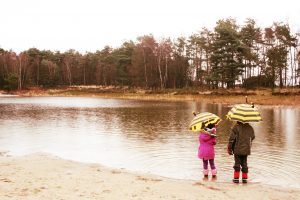 Even before I became a mother, I had a particular wish for my future children. Looking back at several not so fond memories of my childhood, I vowed I would do everything for them to have a better one. They shouldn’t have to grow up too fast. They would not have to feel unwanted, misunderstood or worthless. I would guard their innocence and happiness like a hawk.
Even before I became a mother, I had a particular wish for my future children. Looking back at several not so fond memories of my childhood, I vowed I would do everything for them to have a better one. They shouldn’t have to grow up too fast. They would not have to feel unwanted, misunderstood or worthless. I would guard their innocence and happiness like a hawk.
The major driving force behind the different attempts of therapy I tried throughout the years, was the well-being of my (future) kids. I wouldn’t allow mistakes in motherhood.
In fact, I didn’t want them to become like me at all. Just like the mother who really tries hard not to show her child how much she is freaked out by spiders, in order not to raise a little arachnophobic like herself. My list of not-to-pass-ons was just longer: low self esteem, perfectionism, fear of failure, social clumsiness, easy overstimulation and of course CFD: ‘continuously fretting disorder’.
The first five years of motherhood, I had the impression I could accomplish all this. I actually felt like the perfect mother: patient, involved, crafty, warm. I even managed to stick to my not-to-pass-on-list. It would cost me quite some effort, but I would not interfere when my son was building a crooked tower, so he could not catch my perfectionism. Trying not to pass on perfectionism while desperately trying to be a perfect mother. It may sound absurd now, but back then, it totally made sense.
Three years ago, my perfect balance in motherhood shifted drastically. When our son turned five, we couldn’t ignore anymore that he was going to develop at a speed different from his peers. At the same time, our adopted daughter arrived, aged two and a half.
They both forced me to face my demons better than any therapy has ever done throughout the years.
My son and I, we discovered developing an intelligence and sensitivity far beyond our physical age, is a struggle we share. Where his friends will watch a grazing cow on a field trip and complain about the stench, he will likely try to understand why this mammal has four stomachs, how to measure the circumference of the pasture and how long it would take for the cow to eat all that grass. And how much dung it would have produced by then, of course. His sense of humour is still a seven year old’s.
My daughter and I, we’ve been battling childhood trauma and attachment disorder together. We cried together in the shower numerous times, holding each other fiercely. The battle has been rough. It still is. Sometimes I just can’t comfort her like I should, because I need comforting myself. But she amazes me with a resilience I just can’t manage. She might be jumping on the trampoline and singing imaginary happy-songs, while I crash on the couch to mentally recover from holding her mourning and kicking little body for over half an hour.
It has been extremely painful to see my least fond childhood memories revive in my kids.
Comforting a son that feels like an alien, desperately trying to cover up his super powers because he just wants to blend in. Reassuring a daughter that follows me around the house like a puppy because she just can’t believe she won’t be abandoned again.
Painful. Heart wrenching. And feeding the CFD by the tons.
However, I’m seeing now that our struggles do not necessarily have to be the same. Because, you know, they have me. Of course I can’t protect them from being hurt. No mother can do that for her children. It’s one of the curses of being a mother.
But as it turns out, as a ‘damaged’ mother, I might be the perfect guide for my heavy-hearted children.
I’m teaching my son first handed how to make use of his extraterrestrial powers, without a need to blend in. I’m even coaching him in failing and making mistakes without believe it’s the end of the world. I surely acknowledge how important that lesson is. He’ll get it much earlier than I did.
I’m confidently ignoring outsiders’ advice on how to deal with my daughter’s anxieties, since I recognize how she feels. When she’s grieving, I guard her like an eagle that will not allow anyone to question or mock her tears of grief. I’m determined to give her what I never got. I will make her feel loved and understood. Unconditionally.
Me, I’ve only discovered how to find happiness after a painful and lonely journey.
I intend to show my children all the short cuts.
They will have a splendid childhood.
How do you see your own childhood reflected in your children? Is it mostly warm or can it be painful as well?
This is an original post to World Moms Blog by K10K from The Penguin and The Panther.
The picture in this post is credited to the author.
If you ask her about her daytime job, Katinka will tell you all about the challenge of studying the fate of radioactive substances in the deep subsurface. Her most demanding and rewarding job however is raising four kids together with five other parents, each with their own quirks, wishes and (dis)abilities. As parenting and especially co-parenting involves a lot of letting go, she finds herself singing the theme song to Frozen over and over again, even when the kids are not even there...
More Posts

by Sisters From Another Mister | May 9, 2014 | 2014, Communication, Kids, Older Children, Parenting, World Motherhood, Younger Children
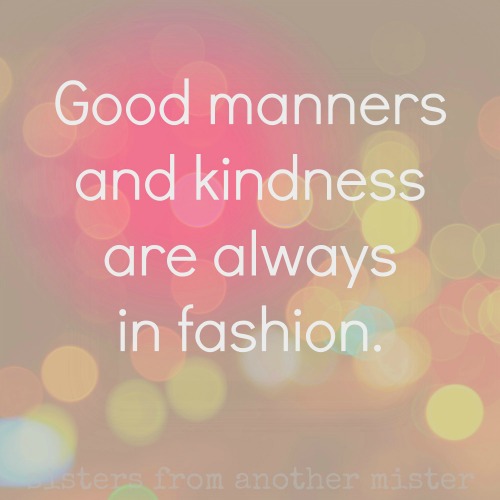 Small acts of kindness, a word or a gesture, making a difference … or simply connecting with others. Do you keep your eyes averted when walking down a street? Or do you smile at the people you pass by? Do you avoid contact with strangers, or do you catch their eye and hand out random compliments? My girls roll their eyes sometimes when I compliment a passerby on their sweater, or a nice hair cut. “That color looks lovely on you” never fails to give someone a smile. A little feel good moment. (more…)
Small acts of kindness, a word or a gesture, making a difference … or simply connecting with others. Do you keep your eyes averted when walking down a street? Or do you smile at the people you pass by? Do you avoid contact with strangers, or do you catch their eye and hand out random compliments? My girls roll their eyes sometimes when I compliment a passerby on their sweater, or a nice hair cut. “That color looks lovely on you” never fails to give someone a smile. A little feel good moment. (more…)
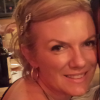
Sisters From Another Mister ...
A blog born from the love of 'sisters' around the world who come together to lift eachother up no matter where they are on their life journey.
Meet Nicole, a transplanted British born, South African raised, and American made Mom of two girls living on the sunny shores of South Florida, USA. A writer of stories, an avid picture taker and a keeper of shiny memories.
Sharing the travels of a home school journey that takes place around the globe - because 'the world truly is our classroom'. Throw in infertility, adoption, separation, impending divorce (it has its own Doom and Gloom category on the blog) and a much needed added side of European humor is what keeps it all together on the days when it could quite clearly simply fall apart! This segues nicely into Finding a Mister for a Sister for continued amusement.
When not obsessing over the perils of dating as an old person, saving the world thro organisations such as being an ambassador for shot@life, supporting GirlUP, The UN Foundation, ONE.org and being a member of the Global Team of 200 for social good keeps life in the balance.
Be sure to visit, because 'even tho we may not have been sisters at the start, we are sisters from the heart.'
http://www.sistersfromanothermister.com/
https://www.facebook.com/SistersFromAnotherMister
https://twitter.com/thesistershood
http://pinterest.com/thesistershood/
Global Team of 200 #socialgoodmoms
Champion for Shot@Life and The United Nations Foundation
More Posts - Website
Follow Me:




by Maureen | May 8, 2014 | 2014, Communication, Kids, Parenting, Scoops of Joy, World Motherhood
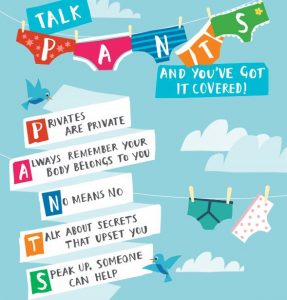 It was the horrific news of sexual abuse at the Jakarta International School in Indonesia that spread the nation like a wild fire.
It was the horrific news of sexual abuse at the Jakarta International School in Indonesia that spread the nation like a wild fire.
It was every parent’s nightmare.
It raised safety issues in school.
My son’s school is installing security cameras outside of the children’s toilets and carrying out special program called “Personal Body Safety” to teach children as early as first grade about it. And most importantly, it opened up discussions between parents and their children and that’s what happened between my son and me.
It was the news that made me read as much information as I could about child sexual abuse. By reading some really helpful articles, I realized it was time to start introducing the ‘real words’ for body parts with my son.
Yes, I had read that one is supposed to use the correct biological terms when you teach your children about their body part but I guess my own personal upbringing prevented me from doing this before. When I grew up, I did not even know what my private parts were called. My parents and their parents’ parents never openly discussed this. Sexuality was a taboo discussion back then, and sadly it carries on into today’s generations, here, in Indonesia.
At first I was uncomfortable in teaching my son to say “penis” now instead of “pee-pee”, but once I realized how this was NOT about me and my uncomfortableness, but something more important, made it easier. This is about me teaching him the right words. We talked about private body parts and how no one should touch them other than doctors IF he is sick and his private parts needs to be examined. We talked about the PANTS and how he needs to avoid being in a situation where adults are getting too close to his private parts.
Such a fine line between educating them and not scaring our children but it is very important to teach them about the boundaries and about protecting themselves. The statistics are so disturbing that your daughter has a 1 in 4 chance and your son has a 1 in 6 chance of being molested before the age of 18. Other than teaching them about private body parts I think it is also important to teach our children to listen to their guts and trust their instincts. I pray hard that my boy and all the children of the world will never have to experience such a traumatic thing but I realize knowledge and awareness are power. So we sit and watched this short movie together, my boy and I.
He asked me questions and I answered them the best that I could. Discussions went on. Yet, I realized we will have to talk about this often to instill in him about the safety parts not to scare him.
How do you talk to your children about sexual abuse?
Here is a very helpful link from the NSPCC site.
This is an original post by our World Mom, Maureen of “Scoops of Joy” in Indonesia for World Moms Blog.
Photo credit to the author.
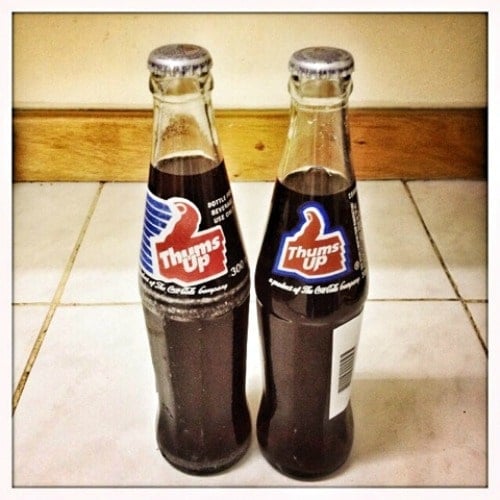
by Jill | May 7, 2014 | 2014, Africa, Bilingual, Multicultural, Philanthropy, World Moms Blog, World Motherhood

Bilingual people are lucky. Not just in all of the usual brain-expanding ways, but because they have options.
Sometimes, English just doesn’t cut it, and I wish I could effortlessly sort through my mental rolodex for a more helpful way to express myself. Code-switching, or flipping back and forth between languages in a single sentence or conversation, is something common to bilingual people, big and small.
My bilingual four-year-old just did it about five times in the last two minutes:
These are my favorite chausseurs.
I can danse très bien avec these.
Mon ami à l’école doesn’t like them.
Je veux…ummm…I want le marqueur to make le dessin!
You don’t even have to be truly bilingual to reap the benefits. Jacomine, from Multilingual Living, gives this example: “When I talk with an [Arabic speaker] in the Netherlands, we might both use Dutch and I might sometimes use some Arabic words in order to identify myself as a person who knows some Arabic, even though my Arabic is very poor. Code-switching is a powerful tool for identification.”
That’s more my style, because while I wish I was a “balanced bilingual,” it will never be so. I can function in French and Spanish, but I think and dream in English. Unfortunately, I’m stereotypically American in my relative monolingualism. However, after three years in Congo, there are several French phrases I appreciate for their descriptive power. I will share three of them, but with the disclaimer that I may have invented my own understandings in the midst of my adult-language-learner’s fog. I also acquired all of my French in Africa, not France. Apologies, and please feel free to laugh.
#1: On est là.
This phrase sort-of-literally means “we are here.” I hear it a lot around Kinshasa, usually from people who want you to be extra aware of their presence and help. I like it because it feels more subtle than “at your service,” but still demands a certain degree of recognition. It seems like a way to point out that you are offering time, skills or attention that deserves appreciation. I’ve been thinking about this a lot after reading The Confidence Gap last week. Women of the world: on est la!
#2: Ça va un peu.
Sometimes you just aren’t okay, and it’s fine to say so. I say, “Ça va?”, about fifty times a day. The conversation often goes like this:
Jill: Ça va?
Other person: Ça va un peu… (“I’m a little okay…”)
Jill: Ohh? Pourquoi?
Other person: (long story about worries, illness or other trouble)
When I ask someone if they are okay in English, the response 99% of the time is, “I’m fine”. In French, although I sometimes I dread the explanation, I believe in the opportunity to truly express yourself. I find that I’ve been embracing emotional honesty more often au français.
#3: Bon courage!
This is an important one. I can’t think of a way to tell someone in English with equal sincerity and brevity to “take heart,” “be brave,” and “have godspeed” all at the same time. This simple phrase gets the job done neatly and concisely. People have said bon courage to me at some of my most tender moments; when my child was hospitalized, when I was facing a tough decision or when I felt tired and sad. Somehow, the phrase bon courage never seems trite.
I always think it would be the perfect thing to say to a woman in labor – somehow expressing, “You can do this, but you have to do it yourself. No one can help you, but you will be okay. Have courage.” All that in just two perfect words.
Some things just sound better in French.
What do you think? Can you think of any phrases in languages other than English that use less words to express so much more?
This is an original post written for World Moms Blog by Jill Humphrey. You can find Jill blogging with Sarah Sensamaust at Mama Congo.
Photo credits to the author.

by Tinne from Tantrums and Tomatoes | May 5, 2014 | 2014, Awareness, Being Thankful, Belgium, Communication, Cultural Differences, Culture, Eye on Culture, Family, Holiday, Husband, Inspirational, International, Kids, Motherhood, Tantrum and Tomatoes, Traditions, Womanhood, World Motherhood
 These days, the internet is humming with all things Mother’s Day related: special brunches, crafts, gift ideas. All for that special person you get to call ‘Mom’.
These days, the internet is humming with all things Mother’s Day related: special brunches, crafts, gift ideas. All for that special person you get to call ‘Mom’.
Mother’s Day earned its place on the calendar thanks to the efforts of American Anna Marie Jarvis. She organized the first Mother’s Day to commemorate her own mother, Ann Reeves Jarvis, who had helped organise the ‘Mother’s Day Help Clubs’ during the American Civil War. In 1914, Woodrow Wilson decided that Mommy Dearest would get her special day each second-Sunday of May.
Not here. In the rest of Belgium, yes. But not in the province of Antwerp. Here we wait until the 15th of August.
Not because we disdain the second Sunday of May, nor have a problem with holidays coming from across the Atlantic. No, as a matter of fact both the American and Antwerp traditions originated at much the same time.
For Antwerp and its surroundings it all began in 1913 when Antwerp born artist Frans Pieter Lodewijk van Kuyck started the tradition as a way of getting people to pay more attention to family values and social order. Modernisation and the industrial revolution, Mr. van Kuyck felt, had screwed society up a wee bit too much and it was time to take a stand, to defend traditional ways.
And since Mother is at the core of the family, when better to highlight her importance than on the 15th of August, the feast of the Assumption of the Virgin Mary. A Catholic feast already celebrated in Antwerp with a huge procession honouring the Virgin as protector of the city. There already was a party going on anyway, so why not add a little extra?
Mr. van Kuyck was not only an artist, he was also alderman for Culture and Fine Arts of the city of Antwerp. So in this official capacity he set up a propaganda committee, mobilised schools, companies and media into promoting the celebration of Mother. Children were to make a special gift and fathers were expected to buy flowers or jewellery. Brunch had not yet come into fashion then, otherwise I’m sure he would have made it mandatory too.
The rest of Belgium did not follow, but instead adapted the new ‘American’ version. Thus, during May when every other mother in the country smiles her lovely so-happy-with-the-macaroni-necklace smile and updates her Facebook status with pictures of her breakfast in bed/fresh flowers/chocolates/whatever…we trudge on and wait our turn until August.
Have no fear, thanks to the school’s Craft Hour, I too receive a pretty handmade gift from my daughters in May. But my husband still has to buy my flowers in August. Nah.
Does your country have a special Mother’s Day tradition? Or do you celebrate differently?
This is an original post to World Moms Blog from our writer in Belgium, Tinne, of Tantrums and Tomatoes.
The image used in this post is credited to the author.
Born in Belgium on the fourth of July in a time before the invention of the smart phone Tinne is a working mother of two adorably mischievous little girls, the wife of her high school sweetheart and the owner of a black cat called Atilla.
Since she likes to cook her blog is mainly devoted to food and because she is Belgian she has an absurd sense of humour and is frequently snarky. When she is not devoting all her attention to the internet, she likes to read, write and eat chocolate. Her greatest nemesis is laundry.
More Posts - Website
Follow Me:



by Kirsten Doyle (Canada) | May 2, 2014 | 2014, Adolescence, Autism, Awareness, Canada, Motherhood, Older Children, Parenting, Puberty, World Motherhood
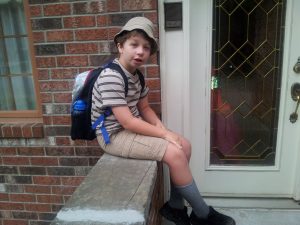 A few months ago, my older son George turned ten. I felt a sense of wonderment at the fact that I had actually succeeded in keeping a human being alive for an entire decade. To put this into perspective, let me just say that as a kid I ripped the limbs off my dolls. I was not exactly a poster child for parenting potential. I know more than a few people who might legitimately be surprised that I’ve been more-or-less successful as a mother.
A few months ago, my older son George turned ten. I felt a sense of wonderment at the fact that I had actually succeeded in keeping a human being alive for an entire decade. To put this into perspective, let me just say that as a kid I ripped the limbs off my dolls. I was not exactly a poster child for parenting potential. I know more than a few people who might legitimately be surprised that I’ve been more-or-less successful as a mother.
As George blew out his birthday candles, though, I also felt a jolt of terror. These ten years have gone so quickly, and in just eight more short years, my firstborn child will be nominally (although probably not academically) ready to graduate high school.
But wait! Before that even happens, before we have to make scary decisions about adulthood and post-school life, we have to navigate the stormy teenage years – a period that I don’t think any parent looks forward to, never mind the parent of a child with autism. (more…)

Kirsten Doyle was born in South Africa. After completing university, she drifted for a while and finally washed up in Canada in 2000. She is Mom to two boys who have reached the stage of eating everything in sight (but still remaining skinny).
Kirsten was a computer programmer for a while before migrating into I.T. project management. Eventually she tossed in the corporate life entirely in order to be a self-employed writer and editor. She is now living her best life writing about mental health and addictions, and posting videos to two YouTube channels.
When Kirsten is not wrestling with her kids or writing up a storm, she can be seen on Toronto's streets putting many miles onto her running shoes. Every year, she runs a half-marathon to benefit children with autism, inspired by her older son who lives life on the autism spectrum.
Final piece of information: Kirsten is lucky enough to be married to the funniest guy in the world.
Connect with her on Facebook, Twitter and Instagram.
Be sure to check out her YouTube channels at My Gen X Life and Word Salad With Coffee!
More Posts
Follow Me:




 Even before I became a mother, I had a particular wish for my future children. Looking back at several not so fond memories of my childhood, I vowed I would do everything for them to have a better one. They shouldn’t have to grow up too fast. They would not have to feel unwanted, misunderstood or worthless. I would guard their innocence and happiness like a hawk.
Even before I became a mother, I had a particular wish for my future children. Looking back at several not so fond memories of my childhood, I vowed I would do everything for them to have a better one. They shouldn’t have to grow up too fast. They would not have to feel unwanted, misunderstood or worthless. I would guard their innocence and happiness like a hawk.

 Small acts of kindness, a word or a gesture, making a difference … or simply connecting with others. Do you keep your eyes averted when walking down a street? Or do you smile at the people you pass by? Do you avoid contact with strangers, or do you catch their eye and hand out random compliments? My girls roll their eyes sometimes when I compliment a passerby on their sweater, or a nice hair cut. “That color looks lovely on you” never fails to give someone a smile. A little feel good moment.
Small acts of kindness, a word or a gesture, making a difference … or simply connecting with others. Do you keep your eyes averted when walking down a street? Or do you smile at the people you pass by? Do you avoid contact with strangers, or do you catch their eye and hand out random compliments? My girls roll their eyes sometimes when I compliment a passerby on their sweater, or a nice hair cut. “That color looks lovely on you” never fails to give someone a smile. A little feel good moment. 















